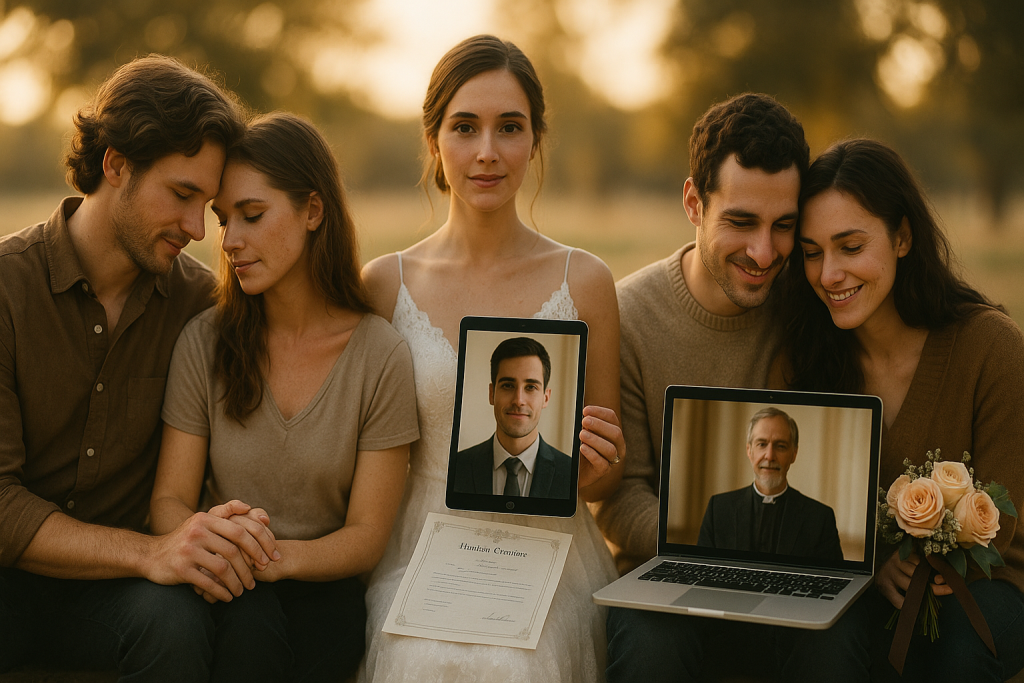Eloping has always been about intimacy and simplicity, and with today’s technology, planning a virtual elopement has never been easier. Whether you’re separated by distance or simply prefer a low-key ceremony, getting married online offers a unique and personal way to say “I do.” Let’s walk through the quick and easy steps to plan your virtual wedding.
1. Understand the Legalities of Online Marriage
Before diving into the planning process, it’s crucial to understand the legal requirements for an online marriage. Different states and countries have varying laws regarding virtual weddings. Ensure that your virtual marriage will be legally recognized in your jurisdiction. For more detailed information, check out our Online Wedding Ceremony page.
2. Choose a Reliable Online Marriage Service
Selecting a reputable service is key to a smooth virtual elopement. Look for platforms that offer comprehensive packages, including officiants, marriage licenses, and technical support. Our Get Married page provides a seamless experience for couples looking to tie the knot online.
3. Obtain Your Online Marriage License
Acquiring a marriage license is a fundamental step. Many jurisdictions now allow couples to apply for and receive marriage licenses online. Ensure you complete this process in advance to avoid any last-minute hiccups. For assistance, visit our How It Works section.
4. Plan Your Virtual Wedding Ceremony
Even though your ceremony is virtual, it can still be personalized and memorable. Decide on the format, choose readings or vows, and consider incorporating music or other elements that reflect your relationship. Our Online Wedding Ceremony page offers ideas and inspiration.
5. Arrange for an Online Minister
An officiant is essential for your ceremony. Many online marriage services provide licensed ministers who can conduct your wedding via video conferencing platforms like Zoom. Ensure your chosen officiant is authorized to perform virtual weddings in your jurisdiction.
6. Prepare Your Technology
Technical glitches can disrupt your special day. Test your internet connection, familiarize yourself with the video conferencing platform, and ensure all devices are charged and functioning properly. Consider having a tech-savvy friend on standby to assist if needed.
7. Invite Your Guests
One of the perks of a virtual wedding is the ability to include loved ones from around the world. Send out digital invitations with clear instructions on how to join the ceremony. You might also consider creating a virtual wedding program to guide your guests through the event.
8. Celebrate After the Ceremony
Just because your wedding is virtual doesn’t mean you can’t celebrate! Plan a virtual reception with toasts, dances, and even games. Alternatively, schedule an in-person celebration for a later date when it’s safe to gather.
9. Obtain Your Online Marriage Certificate
After the ceremony, ensure you receive your marriage certificate. This document is crucial for legal purposes and should be stored safely. Our Apostille Service can assist with any additional certification needs.
10. Share Your Joy
Announce your marriage to friends and family through social media, emails, or traditional announcements. Sharing photos or recordings of your virtual wedding can help loved ones feel included in your special day.
FAQs
Is an online marriage legally binding?
Yes, as long as you comply with the legal requirements of your jurisdiction, an online marriage is legally binding. It’s essential to research and adhere to local laws.
How do we obtain a marriage license for a virtual wedding?
Many jurisdictions allow online applications for marriage licenses. Check with your local marriage bureau or use our How It Works guide for assistance.
Can we have guests at our virtual wedding?
Absolutely! Virtual weddings allow you to invite guests from anywhere in the world. Ensure they have the necessary links and instructions to join the ceremony.
What platform should we use for our virtual wedding?
Platforms like Zoom, Skype, or Google Meet are popular choices. Choose one that you’re comfortable with and test it beforehand to ensure a smooth experience.
How do we get our marriage certificate after a virtual wedding?
After the ceremony, the officiant will typically file the necessary paperwork. You’ll receive your marriage certificate by mail or electronically, depending on your jurisdiction.
Planning a virtual elopement can be a straightforward and joyful process. By following these steps, you can create a memorable and legally recognized online wedding. If you have any questions or need assistance, feel free to contact us. We’re here to help make your virtual wedding dreams come true!




